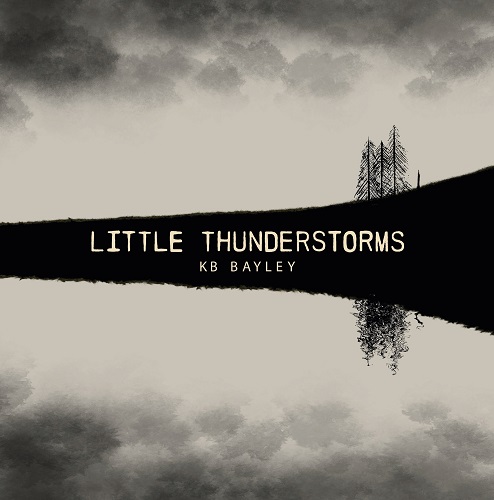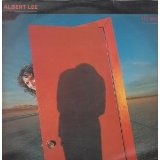
The opening line of the press release for “Little Thunderstorms” introduces KB Bayley succinctly: ‘Guitar player, songwriter, composer. Lover of wood, steel, valves and song.’ It’s good as far as it goes but it’s far too modest; there are a few superlatives missing in the first sentence for a start. KB’s a stunningly good player who knows what to play (and what not to play) to accompany his vocal. There’s quite a list of musicians playing on the album, but none of the arrangements feel cluttered as the players are used sparingly to create moods and atmospheres, such as the melancholy pedal steel on “Throw It in the River” and the muted trumpet three-in-the-morning jazz club feel of “Night Dogs”.
The songwriting’s powerful and personal and it’s obvious that KB has a keen interest in the art of the song and great writers. “Night Dogs” in name and arrangement is a nod in the direction of Tom Waits, while the album’s opening song “Cold Rain” turns around Leonard Cohen’s line from “Anthem” to ‘someone said there’s a hole in the sky where the night gets in’. Despite KB’s reputation as a session guitar player, the songs aren’t dominated by guitar gymnastics; they’re individual works of art where the words, melody and instrumental backing work together to evoke strong feelings and sometimes painful memories.
“Blood Red Lullaby” aside, with its initial setting in Dallas and JFK reference, “Little Thunderstorms” is a very British album, packed with references to the north-east of England, where KB grew up, and the south coast where he now lives. The sea and the shore are the constants that will always pull us back regardless of how far we leave them behind, and the little thunderstorms are the things that happen to us between leaving and finding our way home again.
Almost inevitably for a touring musician, there are a couple of road songs, the laid-back jazz of “Night Dogs” telling the ‘same hotel, different town’ story, while “Time to Leave Town” is the ‘same partner, different town’ story. Of the album’s eleven songs, there are nine originals plus Jeffrey Foucault’s “Cheap Suit” (a beautiful song about the persistence of a dream that hints at passing the dream to the next generation) and a slide resonator version of the traditional “Wayfaring Stranger (Redux)” that has echoes of Mark Knopfler’s acoustic work – maybe it’s a Geordie thing.
“Little Thunderstorms” straddles the world of the seventies folk singer-songwriters (post-Judas era Dylan when you could use more than an acoustic) and the grittier sound of modern Americana where any mix of styles and instruments is acceptable, and encouraged. The songs are a potent mix of memories where the melancholy outweighs the happy and the vocal is just the right side of raw to pull out the emotion in each one. If that’s your thing (it’s certainly one of mine) then this is the perfect way to start 2021.
If you want a quote to sum up the quality of the writing and the album’s message, how about this: “someone wrote a sign saying ‘jesus lives today’, I look around, I think he moved away” from “Throw It In the River” (check out the video below as well).
“Little Thunderstorms” is released on Friday February 5th on CD, LP and download and streaming services.
 In the days following the sad and untimely death of Phil Everly, one of the musicians who was regularly interviewed was guitarist Albert Lee. I’m willing to bet that most people watching and listening had never heard of Albert Lee, despite his long relationship the Everly Brothers. The fact that he had decided early in his career to play a style of music, country, that has rarely, if ever, been fashionable in the UK meant that he had to move to the USA before achieving real recognition, joining the Crickets in 1974, then replacing the legendary James Burton in Emmylou Harris’s Hot Band in 1976. Anyway, for a few days in early January 2014, all of the old Everly Brothers songs were played across the media. I’m always happy to hear old classics reach a new audience, but the contrarian in me wanted to hear Albert Lee again, so I dug out my old vinyl copy of his second solo album, “Hiding”.
In the days following the sad and untimely death of Phil Everly, one of the musicians who was regularly interviewed was guitarist Albert Lee. I’m willing to bet that most people watching and listening had never heard of Albert Lee, despite his long relationship the Everly Brothers. The fact that he had decided early in his career to play a style of music, country, that has rarely, if ever, been fashionable in the UK meant that he had to move to the USA before achieving real recognition, joining the Crickets in 1974, then replacing the legendary James Burton in Emmylou Harris’s Hot Band in 1976. Anyway, for a few days in early January 2014, all of the old Everly Brothers songs were played across the media. I’m always happy to hear old classics reach a new audience, but the contrarian in me wanted to hear Albert Lee again, so I dug out my old vinyl copy of his second solo album, “Hiding”.
Somehow, in 1979, a single from this album managed to grab a bit of airplay, probably as a result of a particularly persistent plugger, or perhaps it was just a bit of a novelty. “Country Boy”, which opened the album, wasn’t ever going to win an Ivor Novello; it was a lyrical throwaway which showcased Albert Lee’s stunning guitar virtuosity. Throwaway or not, it grabbed my attention immediately and I scuttled off to BG Forbes to buy a copy of the album. Then back to the flat as quickly as possible to introduce vinyl to stylus while avidly reading all of the credits and sleeve notes (even an insert in this case) while listening to the album. I’ve bought many albums on the strength of one song, and I’ve been disappointed almost as many times; nothing else on “Hiding” sounded like “Country Boy” but that didn’t matter because they were all great songs.
Looking at the playing and writing credits, there were a few surprises, even with my limited knowledge of the country scene at that time. Names like Emmylou Harris and Don Everly stood out even then, but looking back with a historical perspective and greater knowledge, Buddy Emmons, Glen D Hardin, Ricky Scaggs, Rodney Crowell, Hank DeVito and Buddy Emmons were highly-respected country players at that time. More of a surprise was the inclusion of songs and performances by Chas Hodges and Dave Peacock who, after nearly twenty years as backing musicians, were now carving out a career performing cockney novelty songs. Actually I wasn’t surprised; I was gobsmacked, particularly after hearing the album’s second song, “Billy Tyler”, a Hodges/Peacock country original. I loved the song from the first time I heard it and I still love it now. I know Dean Owens will probably disagree with me here, but I think it’s the best song they ever wrote. And those are only the first two songs on the album.
“Are you Wasting my Time” is a tasteful cover of the Louvin Brothers classic with Albert Lee taking lead vocal and harmonies alongside Ricky Scaggs. “Now and Then It’s Gonna Rain”, with backing from Chas and Dave, is a country/rock song which hints at earlier Eagles material and side one closes with the beautiful Rodney Crowell ballad “On a Real Good Night”.
The side two opener is “Setting me Up”, a riff-based country/rock song written by the relatively unknown (in 1979) Mark Knopfler which is followed by another Rodney Crowell song “Ain’t Living Long like This”, a shuffle with a hint of the Buster Brown classic, “Fannie Mae”. The album’s title song is another ballad, written by Steven Rhymer (what a great name for a songwriter) and featuring backing vocals from Don Everly. The album closes out with the slow rocker, “Hotel Love”, and “Come up and See Me Any Time”, another Chas and Dave song featuring the dynamic duo themselves on piano and bass.
The album’s a classic because Albert Lee does all the things he does best; he plays guitar, sings lead and harmony vocals and chooses some tremendous songs and players to help him display these talents. There’s only one writing credit for him on “Hiding” but his interpretations of songs by other writers are arranged and played to perfection. You can hear suggestions of other artists including Iain Matthews (another wonderful interpreter of songs) and Eric Clapton but the overall sound is pure Albert Lee. I guess it’s not difficult to see why it wasn’t a hit in the UK in 1979 as post-punk took over from punk, but it has aged very well over the thirty-five years since its release. Even if you don’t normally follow links these articles, have a look at the live performance of “Country Boy” with Vince Gill. It’s not just about the great playing; the audience love it and you can see that the band loves it too. Give it a listen.


